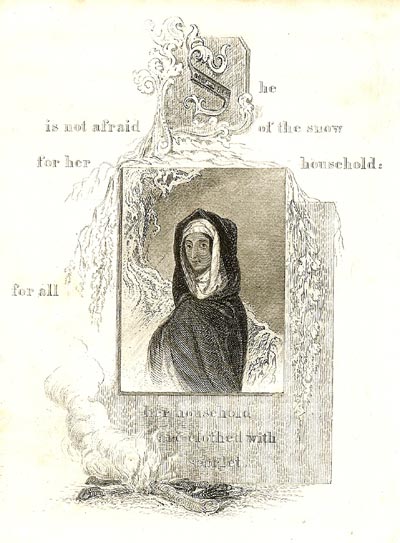*From The Excellent Woman of Proverbs 31 written in 1847 by Anne Pratt (1806-1893)

In the long series of cruel and oppressive acts, to which, in comparatively modern times, the ancient people of God have been subjected, this forethought has, in many instances, degenerated into a spirit of covetousness; and the love of hoarding has been censured in the Jew, by the very men whose rapacious tyranny turned this characteristic virtue into a vice. But the bright example of this pious woman, as portrayed by the Hebrew writer, under the direct inspiration of the Holy Spirit of God, is not that of a mean selfishness, not hers was an enlarged and bounteous providence, one which, while it sought to guard against the ills, and provided for the comforts of the coming days, while it gathered for her family enough and to spare, yet could have an open hand for the poor and needy.
SHE IS NOT AFRAID OF THE SNOW FOR HER HOUSEHOLD;
FOR ALL HER HOUSEHOLD ARE CLOTHED WITH SCARLET.
FOR ALL HER HOUSEHOLD ARE CLOTHED WITH SCARLET.
Proverbs 31:21

We are so accustomed to hear of the serene skies and genial warmth of the climate of Palestine, that we are, in our thoughts, apt to invest that interesting land with a perpetual sunshine.
Although the cold of winter is not so severe as in some other parts of Syria, still it is scarcely less than that experienced in our own country. The autumnal shower is the early rain, for which the "husbandman long waited," that he might sow his seed: and in December, which is the first winter month, the rain falls in torrents, and the snow covers the plains occasionally, and lies on the elevated mountains long after spring has made considerable advance; while hoar‐frost scatters its diamonds, or a mist, like that of our northern climates, obscures the face of nature.
We have various other instances in Scripture, besides that quoted at the head of the chapter, of the cold and snow of Palestine. The psalmist of Israel sung of the fleeces which the Creator "giveth like wool," and prayed that he might be purified and made "whiter than snow." We infer the cold from the statement of the prophet Jeremiah, when he described Jehoiakim, king of Judah, as sitting with his nobles around the hearth, and daringly cutting with his penknife, and casting into the fire, the scroll which contained the denunciations of the Almighty. So again, in that sad hour, when the affectionate but frail apostle denied the Master whom he loved, we read that they had kindled a fire in the midst of the hall, and that Peter and others sat down together by it, "for it was cold."
Most commentators think that the Hebrew word rendered "scarlet," would be more correctly translated by the marginal reading, "double garments." It is thus rendered by Boothroyd in his version of Scripture, and the Septuagint and Arabic versions give it thus. The twice dyeing, which formed part of the process used in obtaining the brilliant scarlet of the East, caused this color to be expressed in the original language, by the verb to redouble, and thus leaves the rendering in some measure doubtful. Dr. Adam Clarke states, in his commentary, that his old manuscript Bible renders this part of the passage "ben clothed with double;" and adds that Coverdale, with equal propriety, translates it, "For all hir household folkes are duble clothed."
There are, however, some commentators who consider scarlet as the right rendering of the word from the original. Dr. Gill remarks, that if the word here used had been designed to be "double," it would have been in the dual number; and as this is not the case, he considers that in this, and similar instances, it is used for the scarlet color. He adds that both the Targum and Aben Ezra thus interpret it.
Supposing the word scarlet to be the correct translation in this passage, it would refer to the clothing provided by the Jewish matron for her husband and children only, and would not include the dress of her servants. Scarlet was a color much esteemed in the East, and the Jewish nobles and courtiers were accustomed, on state occasions and festivals, to wear robes of this brilliant dye. In that exquisitely touching lament, uttered by David over the fallen king, he exclaims, "Ye daughters of Israel, weep over Saul, who clothed you in scarlet, with other delights, who put on ornaments of gold upon your apparel" (2Sa 1:24).
In the long series of cruel and oppressive acts, to which, in comparatively modern times, the ancient people of God have been subjected, this forethought has, in many instances, degenerated into a spirit of covetousness; and the love of hoarding has been censured in the Jew, by the very men whose rapacious tyranny turned this characteristic virtue into a vice. But the bright example of this pious woman, as portrayed by the Hebrew writer, under the direct inspiration of the Holy Spirit of God, is not that of a mean selfishness, not hers was an enlarged and bounteous providence, one which, while it sought to guard against the ills, and provided for the comforts of the coming days, while it gathered for her family enough and to spare, yet could have an open hand for the poor and needy.
